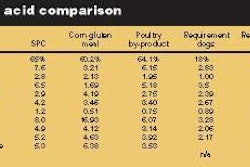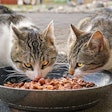Those readers who remember my commentary on the theory of "Structured Procrastination" ( Petfood Industry , August 2001) may recall that in order to increase your productivity, you have to designate something to be of more importance and/or urgency so you thereby can avoid it through work on other projects. Since completion of this column was my most pressing deadline, I naturally decided to organize my office.
Mind you, it's not that my office couldn't use some serious systematization. I believe it's approaching the state of absolute entropy, wherein no single item in the room has any relation to any of the items next to it. Still, after 7-plus years getting that way, there's certainly no rush. Anyway, while throwing out some old journals (except for previous issues of Petfood Industry, of course), I ran across a number of interesting items on the subjects of pets, nutrition and related topics.
Fortunately, a new urgent project arose, so that under my system I can now put my virtual pen to paper and share a few of my discoveries with you.
From the "Do not feed the animals" Department
Most people are aware of the potential toxicity of chocolate when fed to pets, but they may need to be aware of feeding grapes and raisins as well. While the cause is not understood, these foods have been found to result in kidney failure when consumed in large quantities by dogs. While this news item was in a journal from 2001, I haven't been able to find anything that contradicts or updates this reported finding.
A warning has been issued that eating cigarettes can be harmful to dogs, cats and birds. While hopefully already obvious to most people, the fact that ingestion can sometimes result in fatality is especially worth noting. The authors suggest keeping tobacco products and filled ashtrays out of reach of animals. Whether tobacco should be out of reach of people or not was not mentioned in the article.
Some owners of reptiles or other insectivores (like me) like to catch bugs to supplement their pets' diets. If you are one of them, too, don't include fireflies (also known as lightning bugs and glowworms) on the menu. Consumption of a single firefly may be fatal to some of these exotic critters.
From the "Did they really say that?" Department
An official from the European Union has been quoted as saying: "Misuse of Viagra is responsible for more deaths than BSE." This quote was made as a prelude to discussion on the need for sound scientific principles, not consumer fears, to guide food safety policy. I assume the quote is factually accurate, it certainly seems likely to be correct, albeit perhaps slightly unbecoming when said in a speech from a public worker (I don't have to worry about that any more).
However, considering what I understand to be the EU's relatively restrictive position on matters such as genetically engineered foods, use of hormones in livestock and other related issues, I was more surprised at the source of the quote than anything else.
From the "Looks terrible, tastes terrific" Department
The fundamental precept of the animal feed industry, if not the domestication of animals itself, is that animals can and will eat foods we can't or don't want to (ruminants eating hay being a prime illustration). An example of previously-discarded materials under study as potential feedstuffs is the feeding of cattle a spent Mediterranean fruit fly diet (obtained from rearing "medflies" for subsequent sterilization and release to control populations in the wild).
What the flies leave behind still has lots of nutrients in it, so once properly processed, it makes a good supplement to the feed and solves an expensive disposal problem at the same time. Going one step further, a system that harvests the larvae of the black soldier fly from livestock manure results in a good protein source for use in swine, chicken and fish feeds, while decreasing house fly populations in the process. A chicken rancher in Arkansas, USA developed an efficient way of disposing of dead chickens by feeding them to his farmed alligators. Please note that NONE of these are proposed for use in petfoods, although the soldier fly larvae have been successfully fed to farmed bullfrogs, hence may have some future application in the specialty petfood market.
Because birds have a diminished sense of taste, capsaicin (from chili peppers) has been used on wild bird seed mixes to help keep squirrels away. As an owner of a backyard chicken flock, I was interested to note that it also can be used to deter rats from eating poultry feed. I got the impression from the article that the authors of the study were somewhat disappointed that it may alter egg flavor and color, too. However, if marketed correctly and if the regulatory hurdles could be overcome (technically, capsaicin would be a "pesticide" when used in that manner), a "pre-seasoned" egg sounds like a good value-added marketing opportunity.
And finally, from the "Silly Rules" Department
If you think you have problems with some of FDA's and AAFCO's regulations, you'll love this tidbit from Brazil. Apparently, the federal legislature of that country is pondering a new law that would prohibit giving your pets "human" monikers. Apparently, this is to save people from the embarrassment of having someone else's pet sharing their names.
If it passes, I guess I won't be able to bring my dogs and cats (named Sarah, Sheila, Yolanda and Vincent) to Carnival any more!


















